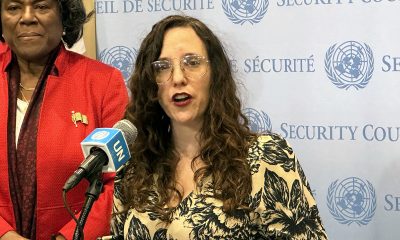Europe
Berlin becomes refuge for LGBTQ Ukrainians
Dmitry Shapoval swam across river to flee Ukraine
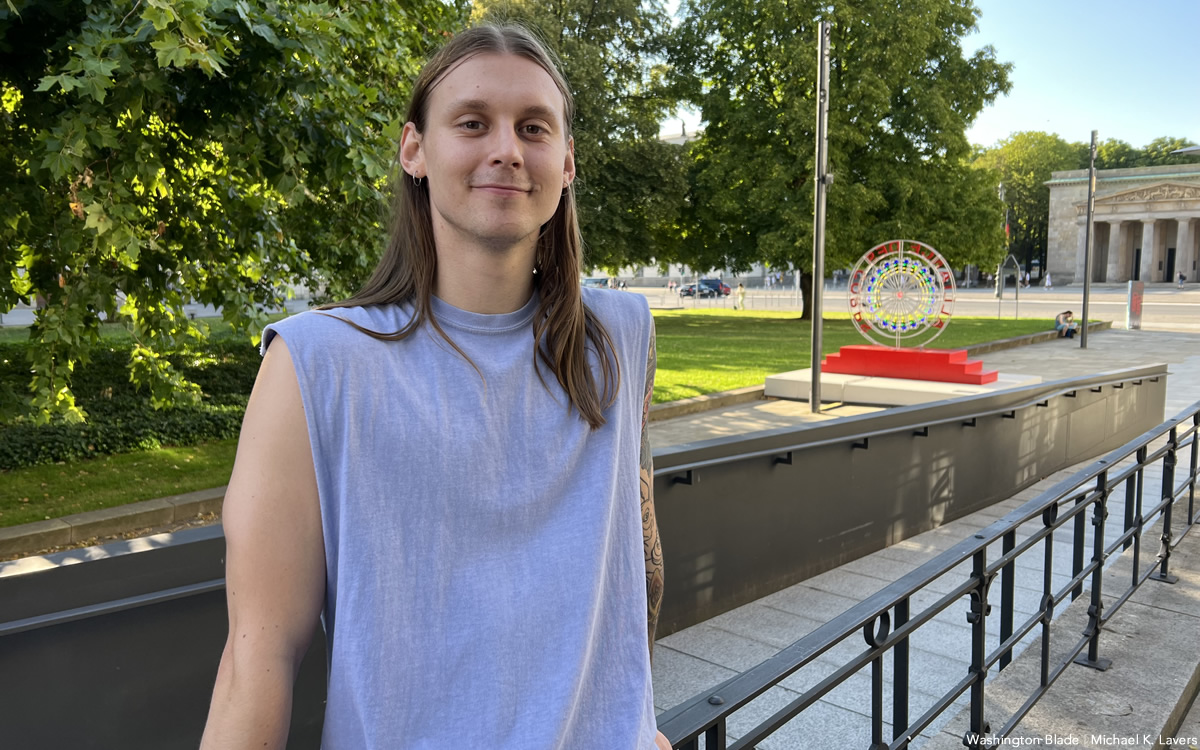
BERLIN — Dmitry Shapoval is a 24-year-old gay man from Ukraine who lives with HIV.
He was working at an IT company’s call center and studying web and UX design in Kyiv, the Ukrainian capital, in February when Russia launched its war against his country. Shapoval swam across a river and entered Poland less than a month later.
Shapoval now lives in Berlin with his cat Peach and has begun the process of resettling in Germany.
“I feel very secure here,” Shapoval told the Washington Blade on July 22 during an interview at Berlin’s Palais Populaire by Deutsche Bank on the city’s Unter den Linden boulevard.
Shapoval is one of the more than 900,000 Ukrainians who have arrived in Germany since the war began.
Ukrainians are able to enter Germany without a visa, and the German government provides those who have registered for residency a “basic income” that helps them pay for housing and other basic needs that include food. Ukrainian refugees can also receive access to German language classes, job training programs and childcare.
Anastasiia Baraniuk and her partner, Yulia Mulyukina, were living together Dnipro, a city on the Dnieper River in central Ukraine, when the war began.
Mulyukina, who is from Russia, was living in Moscow when she and Baraniuk began to talk online. Mulyukina traveled to Lviv in western Ukraine via Istanbul to meet Baraniuk, who is a Ukrainian citizen.
Mulyukina on July 22 told the Blade at Palais Populaire that she asked the Russian Embassy in Kyiv for help when the war began. Mulyukina said officials suggested that she “ask Ukraine what to do.”
“I was really shocked that my own country, with this idea of bringing peace, bringing quiet to Ukraine, just rejected me entirely,” she said in Russian as Shapoval translated.
Baraniuk, who also spoke with the Blade in Russian, said the Ukrainian government and a local NGO provided them with food and money.
The couple had planned to stay in Ukraine, but they decided to leave after Mulyukina “heard five explosions” while she was walking to a store. The two women’s friends gave them money to buy train tickets to Poland.
Insight, a Ukrainian LGBTQ and intersex rights organization, helped Baraniuk and Mulyukina and their cat enter Poland. They spent a week there before they arrived in Berlin on April 28.
Shapoval met them when they arrived at the train station.
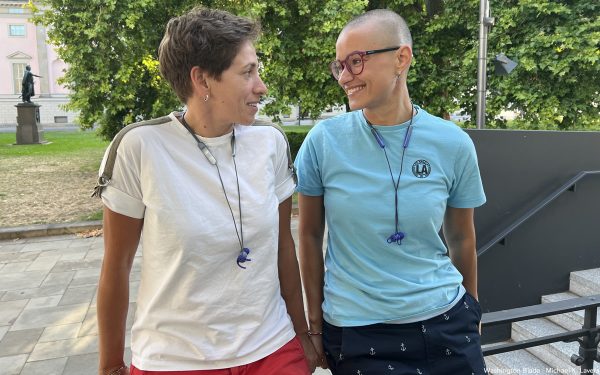
Shapoval, Baraniuk and Mulyukina are among those who attended a reception that took place at the end of a two-day meeting the Organization for Refuge, Asylum and Migration organized that took place in Berlin from July 21-22.
Activists from Ukraine, Germany, Poland, Romania, Moldova, Slovakia, the Czech Republic, the Netherlands, Italy and the U.S. attended the gathering that had a stated goal of starting “the conversation about long-term/mid-term needs and solutions for LGBTIQ Ukrainians and incite collaboration among stakeholders working with LGBTIQ Ukrainians and third-country nationals.”
“We were thrilled to bring together activists and human rights defenders from 10 countries and 20 organizations to develop medium and long-term strategies to support displaced LGBTIQ Ukrainians and third country nationals,” ORAM Executive Director Steve Roth told the Blade after the meeting. “All these organizations, including ORAM, have done an amazing job getting emergency support and services to LGBTIQ Ukrainians in need. As the war in Ukraine drags on, it’s more important than ever for organizations to coordinate efforts and plan for supporting longer term needs. This two-day roundtable in Berlin was a great step in that direction.”
ORAM has partnered with Airbnb.org and Alight (formerly known as the American Refugee Committee) to provide more than 1,000 nights of short-term housing to LGBTQ and intersex Ukrainians and other displaced people in Germany and other countries in Europe. Shapoval, Baraniuk and Mulyukina are among those who live in such apartments.
Roth noted ORAM has begun to develop “a housing collective” for LGBTQ and intersex Ukrainians in Berlin. He said ORAM rents the apartments in which the refugees can live for up to six months, “allowing them to register in Berlin, access social welfare and other services.”
“Safe and secure housing is one of the most urgent needs facing displaced LGBTIQ Ukrainians,” Roth told the Blade. “It’s an essential element in getting settled and rebuilding lives.”
Berlin Pride shows solidarity with Ukraine
The meeting ended a day before the annual Christopher Street Day parade took place in Berlin.
Baraniuk helped carry ORAM’s banner during the parade, while Mulyukina took pictures for the organization.
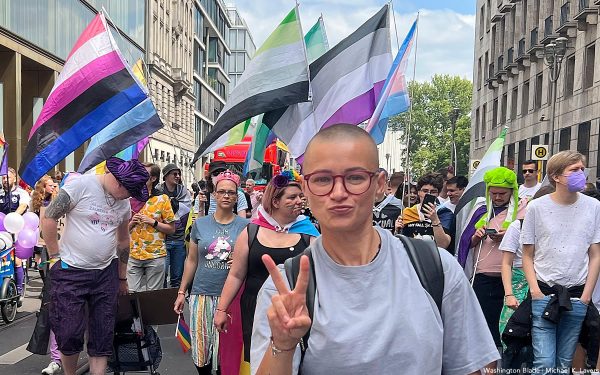
‘Stop Russian aggression’
Kyiv Pride Executive Director Lenny Emson is one of LGBTQ and intersex activists from Ukraine who participated in the ORAM meeting and in the parade.
He told the Blade before the parade began that he took several trains from Kyiv to Poland before he flew to Berlin. Emson said the trip took two days.
“I understand that it is a safe ground, but I still have those flashbacks,” Emson told the Blade as he smoked a cigarette in front of a hotel near the parade staging area. “When you were sitting in the conference room and I saw something that reminds me of an air raid siren I was getting a panic attack. It doesn’t matter if you’re in a safe place.”
Emson also took issue with parade organizers’ opposition to war.
“Unfortunately, we as the Ukrainian community here (are) very disappointed with the motto that Berlin Pride put on the main stage: No war,” said Emson. “This doesn’t reflect the feelings that we have right now.”
“We would like to actually say it loud: Stop Russian aggression,” he added. “We need action right now. We need to stop it. We need to stop Russian aggression. We need to stop it right now.”
A group of marchers held a blue and yellow — the colors of Ukraine’s flag — banner that read “Arm Ukraine: Make Pride in Mariupol possible” while others simply carried the Ukrainian flag.
A man carried a homemade sign that read “Arm Ukraine: Make Pride in Kyiv, Kharkiv, Odesa, Zaporizha, Kryvyi Rih possible again.” Viktoriya, a woman from northern Ukraine who is now pursuing her PhD in Berlin, held a cardboard poster that noted her homeland’s “queer soldiers are fighting for all of us.”
“I’m marching for both rights of queer people and rights of Ukrainians: The right to live and the right for love,” she said as she marched towards Potsdamer Platz in the center of Berlin.
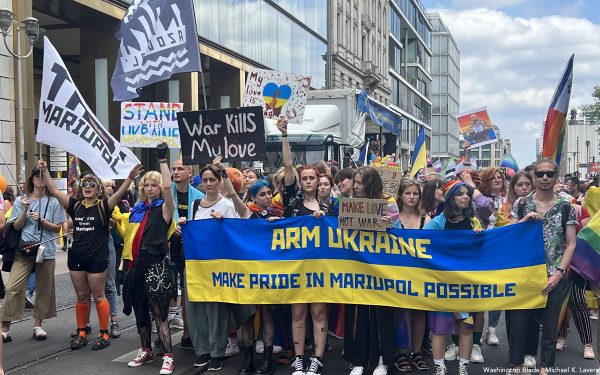
Discrimination and violence based on sexual orientation and gender identity was commonplace in Ukraine before the war.
Ukrainian President Volodymyr Zelenskyy last year pledged his country would continue to fight anti-LGBTQ and anti-intersex discrimination after he met with President Joe Biden at the White House.
Shapoval, who is dating a man he met last October when he traveled to Berlin, told the Blade that he received “looks” in Kyiv if he wore a pink shirt.
He was wearing a pair of purple sneakers during the interview. Shapoval said he would not have been comfortable wearing them if he were still in Kyiv.
“For me it was even harder because I had misery in Ukraine because of homophobes,” he said. “Even the gay community is so toxic in Ukraine because it’s all about toxic masculinity and all of that … I also had some experiences where gays were like, ‘Oh my gosh just cut your hair and then we will get in touch with you.'”
Shapoval has begun the process of applying for German residency.
“I fell in love with the city right from the beginning,” he said. “I found friends here.”
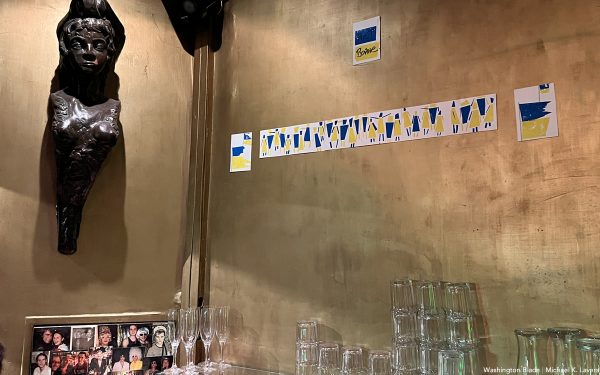
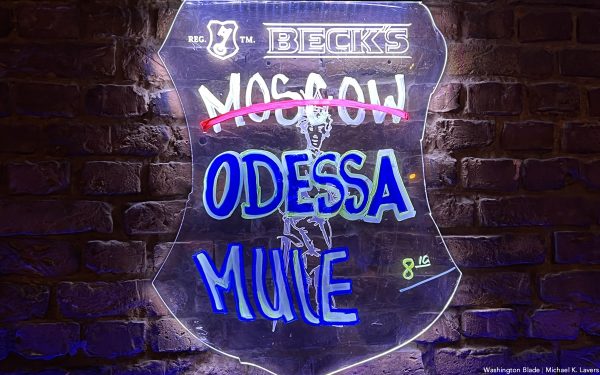
Jessica Stern, the special U.S. envoy for the promotion of LGBTQ and intersex rights, and others have noted transgender and gender non-conforming Ukrainians have not been able to leave the country because they cannot exempt themselves from military conscription. Another issue that LGBTQ and intersex Ukrainians have faced as they attempt to resettle in another country is the lack of legal recognition of their relationships.
A marriage equality petition that Kyiv Pride submitted to Zelenskky on July 12 received more than 28,000 signatures, which is higher than the threshold that requires him to consider it. Ukrainian law requires Zelenskky to respond to it within 10 days of receiving it.
Baraniuk and Mulyukina hope to resettle in the U.S. and Canada, but are unable to legally prove they are in a relationship. The U.S. has a marriage-based immigration system for bi-national couples, while the Canadian system requires them to be married or “common-law partners.”
The U.S. has approved Baraniuk’s resettlement request, but denied Mulyukina.
They said the process to legally prove they are together is prohibitively expensive.”Right now we are looking for a way to get the proof that we are a couple,” said Baraniuk. “We don’t want to stay in Berlin.”
Hungary
Hungarian MPs amend constitution to ban public LGBTQ events
Viktor Orbán’s government spearheaded amendment

Hungarian MPs on Monday voted to amend their country’s constitution to ban public LGBTQ events.
The vote took place less than a month after lawmakers banned Pride events and gave authorities the green light to use facial recognition technology to identify those who participate in them.
The Associated Press notes MPs approved the constitutional amendment — which Prime Minister Viktor Orbán’s Fidesz-KDNP coalition government proposed — by a 140-21 vote margin. Authorities before the vote removed a group of protesters who tried to block the entrance to a parliament parking garage.
Orbán’s government over the last decade has moved to curtail LGBTQ and intersex rights in Hungary.
A law that bans legal recognition of transgender and intersex people took effect in 2020. Hungarian MPs that year also effectively banned same-sex couples from adopting children and defined marriage in the constitution as between a man and a woman.
An anti-LGBTQ propaganda law took effect in 2021. The European Commission sued Hungary, which is a member of the European Union, over it.
MPs in 2023 approved the “snitch on your gay neighbor” bill that would have allowed Hungarians to anonymously report same-sex couples who are raising children. The Budapest Metropolitan Government Office in 2023 fined Lira Konyv, the country’s second-largest bookstore chain, 12 million forints ($33,115.76), for selling copies of British author Alice Oseman’s “Heartstopper.”
Former U.S. Ambassador to Hungary David Pressman, who is gay, participated in the Budapest Pride march in 2024 and 2023. Pressman was also a vocal critic of Hungary’s anti-LGBTQ crackdown.
The Washington Blade has reached out to Budapest Pride for comment on the constitutional amendment.
Denmark
Denmark issues US travel advisory for transgender people
Federal government only recognizes two genders: Male and female

Denmark is the latest country to issue a travel advisory for transgender people who plan to visit the U.S.
“When applying for an ESTA (Electronic System for Travel Authorization) or visa to the United States, there are two gender designations to choose from: Male or female,” reads the travel advisory the Danish Foreign Affairs Ministry issued on Friday, according to the Associated Press. “If you have the gender designation ‘X’ in your passport, or you have changed your gender, it is recommended that you contact the U.S. Embassy prior to travel for guidance on how to proceed.”
President Donald Trump shortly after he took office on Jan. 20 issued an executive order that bans the State Department from issuing passports with “X” gender markers. Secretary of State Marco Rubio in response to directive ordered State Department personnel to “suspend any application requesting an ‘X’ sex marker and do not take any further action pending additional guidance from the department.”
Trump on Feb. 5 issued another executive order that bans trans women and girls from female sports teams. The Guardian reported Rubio later instructed American consular officials to deny visas in “cases where applicants are suspected of misrepresenting their purpose of travel or sex.”
The German government earlier this month issued a travel advisory for trans and nonbinary people who are planning to visit the U.S. The AP notes Finland followed suit.
WorldPride is scheduled to take place in D.C. from May 17-June 8.
InterPride, the organization that coordinates WorldPride events, on March 12 issued its own travel advisory for trans and nonbinary people who want to travel to the U.S.
“Due to an executive order issued by the U.S. president on Jan. 20, all travelers must select either ‘male’ or ‘female’ when applying for entry or visas. The gender listed at birth will be considered valid,” reads the advisory. “If your passport has ‘X’ as a gender marker or differs from your birth-assigned gender, we strongly recommend contacting the U.S. diplomatic mission before traveling to confirm entry requirements.”
The Capital Pride Alliance is the local WorldPride host. Capital Pride said it is working on the guide mentioned in the InterPride advisory.
The guide has yet to be released.
The African Human Rights Coalition, a group that promotes LGBTQ rights in Africa, last week called for a boycott of WorldPride, noting an “antagonistic fascist regime which presents distinct dangers to foreign LGBTQI+ attendees” now governs the U.S. Egale Canada, one of Canada’s largest LGBTQ advocacy organizations, in February announced its members will not attend WorldPride and any other event in the U.S. because of the Trump-Vance administration’s policies.
Hungary
New Hungarian law bans Pride marches
Viktor Orbán’s government has cracked down on LGBTQ rights
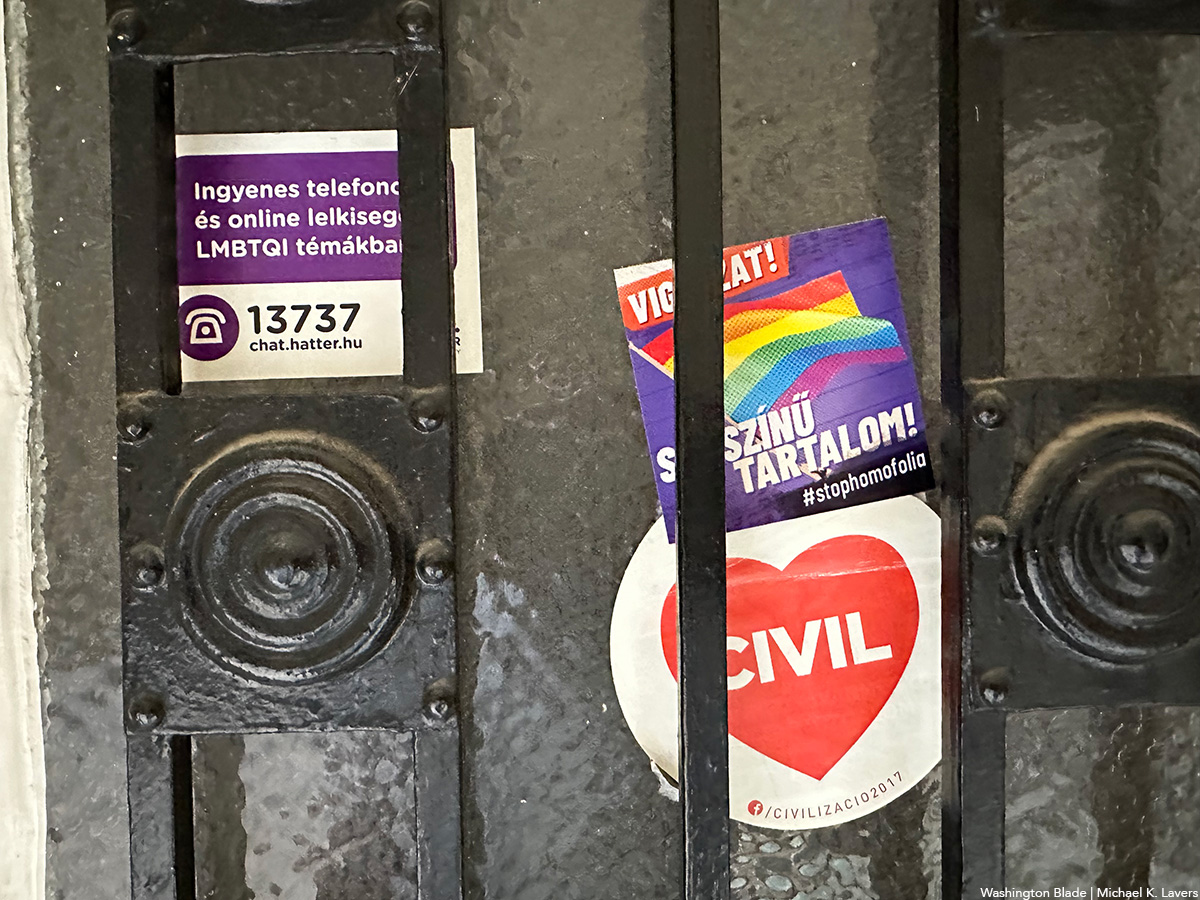
Hungarian lawmakers on Tuesday passed a bill that would ban Pride events and allow authorities to use facial recognition technology to identify those who participate in them.
The Associated Press reported thousands of protesters gathered outside the Hungarian parliament in Budapest, the country’s capital, after MPs approved the measure by a 136-27 vote margin. The protesters later blocked traffic on the nearby Margaret Bridge over the Danube River.
“Not only does this law introduce discriminatory and simply evil restrictions on freedom of assembly, but it was also adopted in a highly undemocratic manner, through an extraordinary procedure that did not allow for any real debate,” said Tamás Dombos of the Háttér Society, a Hungarian LGBTQ and intersex rights group, in a statement that Outright International released after the vote. “They proposed it yesterday, and the parliament adopted it today.”
Amnesty International Hungary Director Dávid Vig also criticized the vote.
“This law is a full-frontal attack on the LGBTI community and a blatant violation of Hungary’s obligations to prohibit discrimination and guarantee freedom of expression and peaceful assembly,” said Vig.
Prime Minister Viktor Orbán and members of his government in recent weeks said they would ban public Pride marches in Budapest. The 30th Budapest Pride is scheduled to take place on June 28.
“The Hungarian government is trying to restrict peaceful protests with a critical voice by targeting a minority,” said Budapest Pride on Tuesday in a statement the Washington Blade published. “Therefore, as a movement, we will fight for the freedom of all Hungarians to protest!”
Orbán and members of his ruling Fidesz party over the last decade have moved to curtail LGBTQ and intersex rights in Hungary.
A law that bans legal recognition of transgender and intersex people took effect in 2020. Hungarian MPs that year also effectively banned same-sex couples from adopting children and defined marriage in the constitution as between a man and a woman.
An anti-LGBTQ propaganda law took effect in 2021. The European Commission sued Hungary, which is a member of the European Union, over it.
MPs in 2023 approved the “snitch on your gay neighbor” bill that would have allowed Hungarians to anonymously report same-sex couples who are raising children. The Budapest Metropolitan Government Office in 2023 fined Lira Konyv, the country’s second-largest bookstore chain, 12 million forints ($33,001.94), for selling copies of British author Alice Oseman’s “Heartstopper.”
Former U.S. Ambassador to Hungary David Pressman, who is gay, participated in the Budapest Pride march in 2024 and 2023. Pressman was also a vocal critic of Hungary’s anti-LGBTQ crackdown.
“We will not be intimidated, we will not give in to bullying,” said Dombos. “We are celebrating Pride for the 30th time in Budapest this year.”
“There was Pride before the Orbán governments, and there will be Pride after,” he added.
Elections will take place in Hungary in 2026.
Budapest Pride spokesperson Johanna Majercsik earlier this month said the Hungarian Helsinki Committee, a Budapest-based human rights NGO, has offered their organization legal advice.
-

 Opinions4 days ago
Opinions4 days agoIt’s time for new leadership on the Maryland LGBTQIA+ Commission
-

 The White House4 days ago
The White House4 days agoWhite House does not ‘respond’ to reporters’ requests with pronouns included
-

 Arts & Entertainment4 days ago
Arts & Entertainment4 days ago‘Gay is Good’ Pride Pils Can Celebrates Frank Kameny’s 100th Birthday for WorldPride in D.C.
-

 Sponsored5 days ago
Sponsored5 days agoTHC Drinks: What You Should Know About Cannabis Beverages





